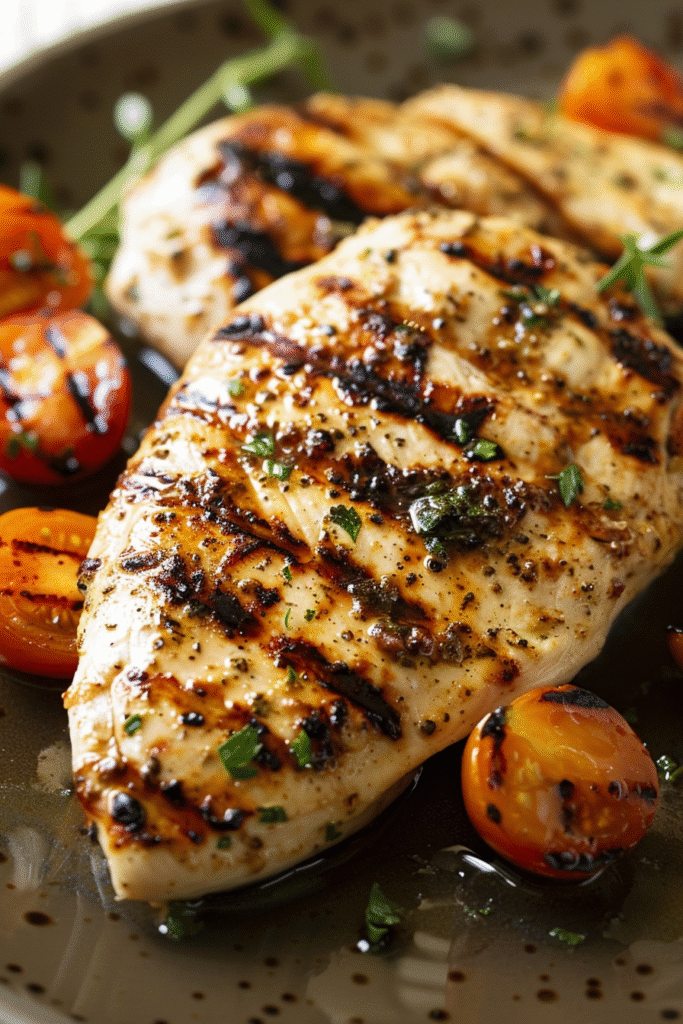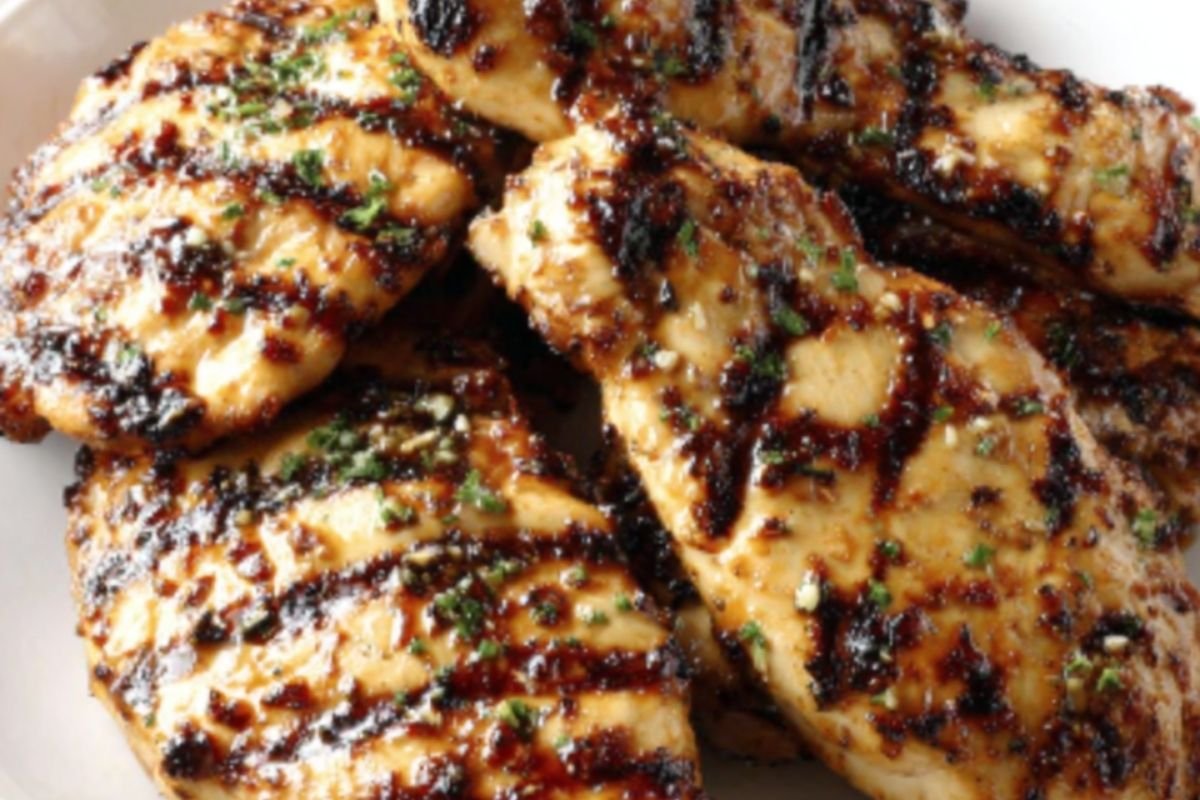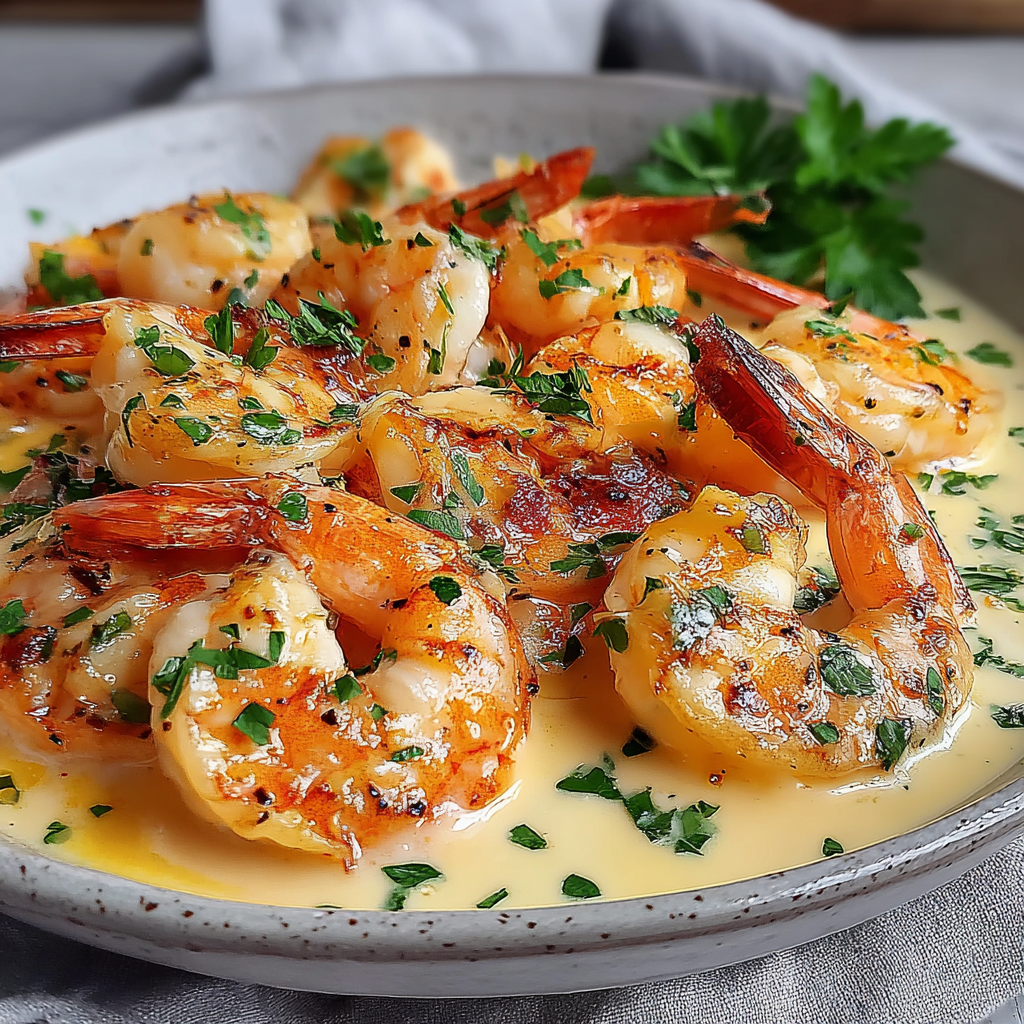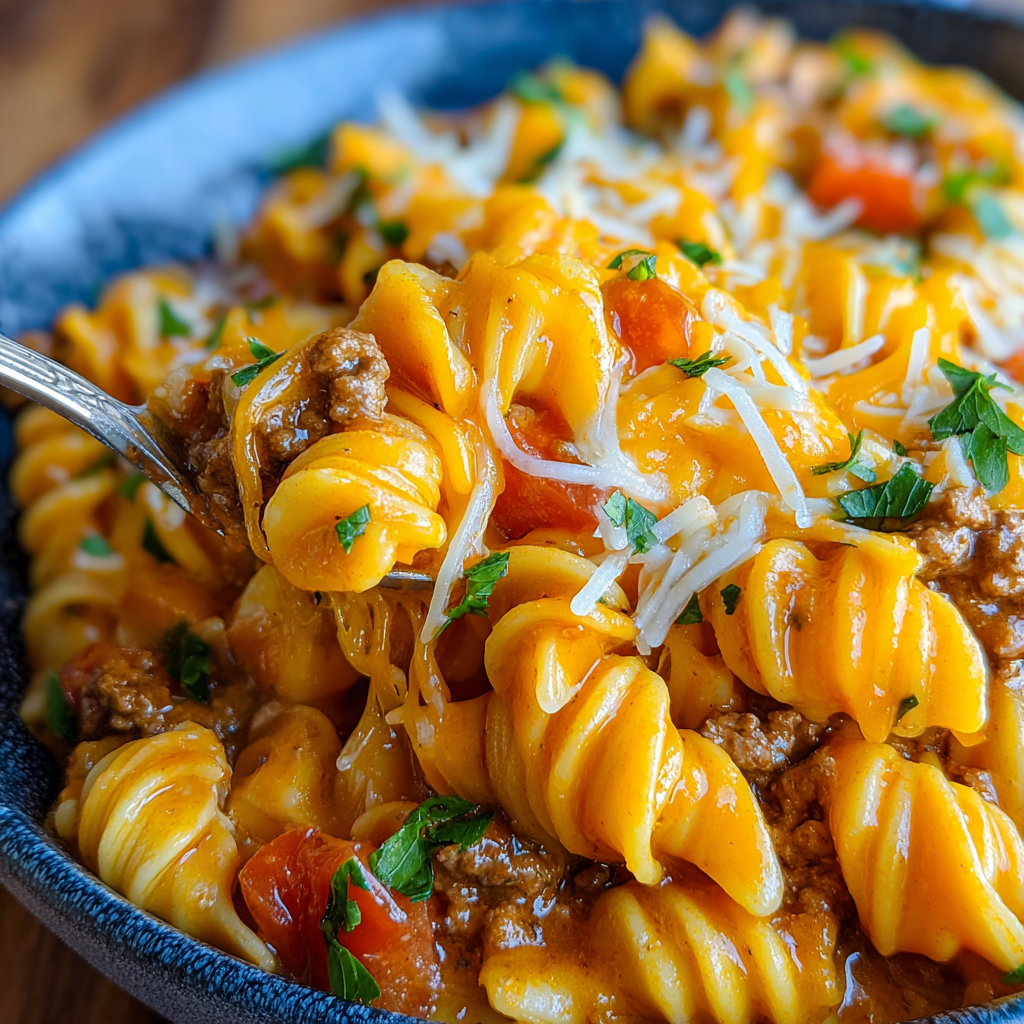There’s something about the smell of chicken sizzling on a grill that instantly brings people together. It’s the sound of summer afternoons, weekend get-togethers, and cozy backyard dinners under the stars. But as any home cook knows, there’s a fine line between juicy grilled chicken and a dry, disappointing bite.
And if you’ve ever bitten into grilled chicken that felt like chewing cardboard, you know exactly what I mean. The truth is, making tender, moist chicken on the grill isn’t a matter of luck—it’s a combination of preparation, technique, and a little bit of science.
Today, we’re diving deep into the art and craft of juicy grilled chicken—not just a recipe, but a complete, foolproof approach to getting it right every single time. Whether you’re cooking on a charcoal grill in your backyard, a gas grill on your balcony, or even a grill pan in your kitchen, this guide will turn you into the kind of cook whose chicken is requested again and again.

Why Juicy Grilled Chicken Deserves the Spotlight
Chicken might be one of the most common proteins around, but that doesn’t mean it’s boring. In fact, it’s one of the most versatile ingredients in the culinary world. The beauty of juicy grilled chicken lies in its ability to adapt to any flavor profile—smoky and spicy for a BBQ, light and citrusy for a summer lunch, or rich and herby for a cozy dinner.
When done right, grilled chicken checks all the boxes:
- It’s healthy. Lean protein, low fat, and full of essential nutrients.
- It’s satisfying. A perfect balance of tender meat and smoky char.
- It’s adaptable. Works with endless sides and sauces.
- It’s a crowd favorite. Rarely will you meet someone who turns down a plate of well-cooked grilled chicken.
Understanding the Moisture Factor
Before we get into marinades, grilling temperatures, or cooking times, we need to address the number one reason chicken goes wrong: moisture loss.
Chicken is lean—especially the breast—which means there’s not a lot of fat to act as a cushion during cooking. Fat keeps meat tender, but with chicken, once the internal temperature climbs too high, those muscle fibers tighten and squeeze out the juices.
Here’s where technique makes the difference:
- Preparation – Marinades or brines to infuse moisture before cooking.
- Cooking control – Managing heat so you don’t overcook.
- Resting – Giving meat time to reabsorb juices before slicing.
These three steps are the backbone of consistently juicy grilled chicken.
The Essential Recipe for Juicy Grilled Chicken
Ingredients:
- 4 boneless, skinless chicken breasts (or thighs for extra juiciness)
- 3 tablespoons olive oil
- 1 tablespoon lemon juice (or lime juice for a zesty twist)
- 1 teaspoon garlic powder
- 1 teaspoon smoked paprika
- 1 teaspoon onion powder
- 1 teaspoon salt
- ½ teaspoon black pepper
Instructions:
- Place the chicken in a shallow dish or resealable bag.
- In a small bowl, whisk together olive oil, lemon juice, garlic powder, paprika, onion powder, salt, and pepper.
- Pour the marinade over the chicken and make sure each piece is well coated.
- Refrigerate for at least 30 minutes, but ideally 3–4 hours for maximum flavor.
- Preheat your grill to medium-high (about 400°F / 204°C).
- Place chicken on the grill and cook for 6–7 minutes per side, depending on thickness.
- Use a meat thermometer—remove chicken from heat at 165°F (74°C).
- Let rest for 5 minutes before serving.
Choosing Your Chicken Cut: Breast vs. Thigh
When talking about juicy grilled chicken, the cut you choose makes a difference.
- Breast: Lean and mild, ideal for lighter meals. Needs careful cooking to avoid drying out.
- Thigh: Higher fat content, richer flavor, more forgiving if you overcook slightly.
- Bone-In Cuts: More flavor and moisture retention, but slightly longer cooking times.
- Wings & Drumsticks: Great for casual BBQs and game days, but more about flavor than precision cooking.
Pro tip: If you’re new to grilling, start with thighs—they’re more forgiving while you perfect your technique.
The Marinade: More Than Just Flavor
A marinade isn’t just about taste—it’s about moisture management. The best marinades have three key components:
- Acid – Lemon juice, lime juice, vinegar, or yogurt. Helps break down muscle fibers for tenderness.
- Oil – Carries flavors into the meat and prevents sticking.
- Seasonings – Herbs, spices, garlic, onions, or chili for personality.
If you want to go pro-level, add a touch of honey or brown sugar—these caramelize beautifully on the grill, giving your chicken that irresistible golden-brown crust.
Brining: The Forgotten Secret
Many people skip brining, but if you want the absolute juiciest grilled chicken, it’s worth the extra step. A basic brine is just water, salt, and sometimes sugar. Soak chicken in the brine for 30 minutes to 2 hours before grilling—it’ll absorb extra moisture that keeps it tender even if you cook a minute too long.
Grilling Techniques for Maximum Juiciness
Direct vs. Indirect Heat
- Direct Heat: Best for searing and locking in juices. Place chicken directly over the flame for the first 2–3 minutes per side.
- Indirect Heat: Move chicken to a cooler part of the grill to finish cooking without burning the exterior.
Gas Grill Tips
- Preheat fully before placing chicken on the grates.
- Keep the lid closed as much as possible for even cooking.
- Clean and oil the grates before use.
Charcoal Grill Tips
- Arrange coals to create a hot side and a cooler side.
- Add wood chips for a smoky flavor boost.
- Use a chimney starter for faster, even heating.
Indoor Grill Pan
- Preheat until almost smoking before adding chicken.
- Press gently with a spatula to ensure full contact with the ridges.
Resting: The Final Step You Can’t Skip
Once your chicken is cooked, it’s tempting to slice into it immediately. Resist! Let it rest for 5 minutes, tented loosely with foil. This allows the juices to settle back into the meat rather than running out onto your cutting board.
Mistakes That Ruin Juicy Grilled Chicken
- Cooking straight from the fridge – Cold meat cooks unevenly. Let it warm up for 15 minutes first.
- Over-flipping – Turn chicken only once for better searing and moisture retention.
- Ignoring thickness – Pound breasts to an even thickness for uniform cooking.
- Skipping the thermometer – Guessing often leads to overcooking.
- Not cleaning the grill – Stuck-on bits can tear the chicken and ruin presentation.
Flavor Twists You’ll Love
- Cajun Heat: Add cayenne, paprika, oregano, and thyme for a spicy kick.
- Herbed Lemon: Fresh parsley, oregano, thyme, and extra lemon juice for brightness.
- Asian BBQ: Soy sauce, sesame oil, garlic, and ginger.
- Sweet & Smoky: Honey, smoked paprika, and chipotle powder.
Pairing Your Juicy Grilled Chicken
- Classic Sides: Corn on the cob, potato salad, grilled asparagus.
- Fresh Options: Mixed greens with vinaigrette, cucumber salad, fruit salsa.
- Hearty Choices: Baked sweet potatoes, wild rice, creamy pasta salad.
- Sauces: Chimichurri, tzatziki, garlic aioli, or mango chutney.
Storage and Reheating Without Losing Juiciness
- Fridge: Store in airtight containers for up to 4 days.
- Freezer: Wrap each piece individually, freeze for up to 3 months.
- Reheating: Low oven heat (300°F) or a skillet with a splash of broth keeps moisture intact.
The Health Perks of Juicy Grilled Chicken
- High-quality protein for muscle repair.
- Low in saturated fat when skinless.
- Packed with B vitamins, phosphorus, and selenium.
- Easily fits into most dietary lifestyles, from keto to Mediterranean.
FAQs About Juicy Grilled Chicken
1. Can I grill chicken ahead of time for a party?
Yes! Grill it slightly under temperature, then finish heating just before serving.
2. How do I prevent sticking?
Oil the grates and the chicken before cooking.
3. What’s the best internal temperature for chicken thighs?
165°F for safety, though thighs remain tender even up to 175°F.
4. Can I reuse marinade?
Not unless you boil it first—raw chicken juices make it unsafe otherwise.
5. Do I need to cover the grill while cooking?
Yes, keeping the lid closed helps retain heat and cook evenly.
Final Thoughts
Cooking juicy grilled chicken isn’t just about feeding people—it’s about creating a moment. The smell of smoky char, the sound of sizzling meat, the first bite that bursts with flavor and tenderness—these are the little pleasures that make cooking worth it. With the right preparation, mindful grilling, and a touch of creativity, you can turn a simple chicken breast into a dish people remember and request again and again. So fire up that grill, season generously, and make tonight the night you master the art of truly juicy grilled chicken.
Print
Juicy Grilled Chicken – From Backyard BBQs to Gourmet Plates
Ingredients
-
4 boneless, skinless chicken breasts
-
2 tbsp olive oil
-
1 tbsp lemon juice
-
1 tsp garlic powder
-
1 tsp paprika
-
Salt & pepper to taste
Instructions
-
In a bowl, mix olive oil, lemon juice, garlic powder, paprika, salt, and pepper.
-
Coat chicken in marinade and refrigerate for at least 30 minutes.
-
Grill over medium-high heat 6–7 minutes per side until cooked through.







